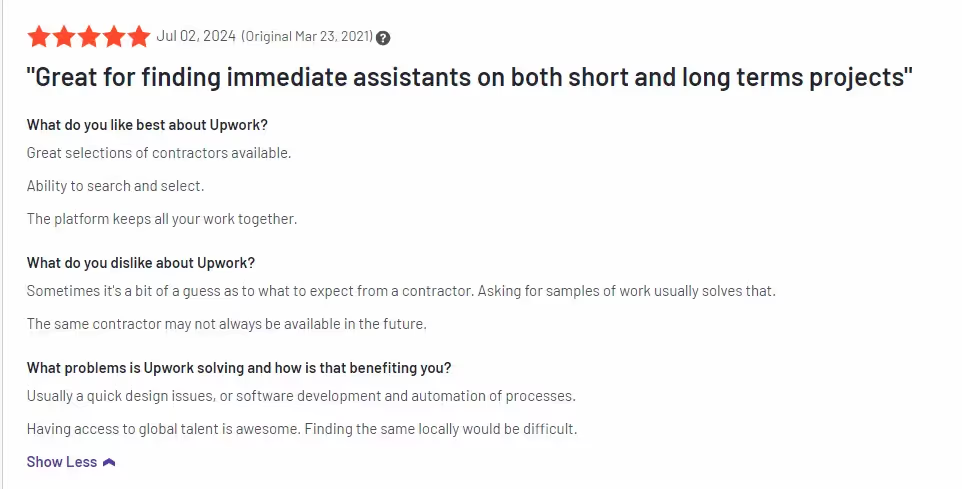While Upwork publicly lists its pricing structure for freelancers, the long-term costs for businesses can be substantial. Upwork connects businesses with independent professionals for various projects, but the overall transparency and cumulative costs often leave businesses looking for more cost-effective solutions.
As an end-to-end solution committed to transparency, Teilur Talent believes it is critical to understand how much a client pays and how much a developer keeps of that payment. This article aims to dissect Upwork's pricing model, and provide insights on how Teilur Talent's transparent pricing model can be a great alternative for companies seeking a partner in international tech recruiting.
Upwork Pricing for Companies in the U.S.
As a freelance marketplace rather than an agency, Upwork employs a fee structure that includes various charges for both freelancers and agencies:
- Freelancer Service Fees: Freelancers pay a 10% service fee on their earnings. For example, if a freelancer earns $500, they pay $50 in fees, resulting in a net earning of $450.
- Agency Service Fees: Agencies also pay a 10% service fee on contracts.
- Project Pricing: Projects and prices are set by the clients who need the services, and freelancers can make counteroffers. This dynamic can result in a wide range of pricing, from as low as $5 per hour to over $130 per hour for software development.
- Exceptions: Upwork offers various specialized fee structures for different contract types, sometimes providing reduced or zero fees:some text
- Upwork Payroll: Freelancers paid through Upwork Payroll are managed by a third-party staffing firm, exempting them from the standard 10% service fee.
- Any Hire Contracts: If a client hires a freelancer they found outside Upwork, or converts an existing Upwork freelancer to a direct hire, these contracts can have negotiated fees and may not incur the typical 10% charge.
- Direct Contracts: These involve clients without Upwork accounts but who pay through Upwork, incurring a reduced 5% service fee instead of the usual 10%.
- Bring Your Own (BYO) Contracts: Freelancers who bring their clients to Upwork can benefit from a 0% service fee or the standard 10% rate, depending on the specific arrangement.
These fees can add up, making financial planning more complex for businesses. For instance, hiring a freelancer at $22.22 per hour results in a 10% fee of $2.22 per hour. If the freelancer works 12 hours, the client is charged $266.64, with the freelancer earning $239.98 after fees. This example highlights the potential financial impact of Upwork pricing.
Moreover, the flexibility in project pricing can lead to significant variations, with hourly rates for software development often exceeding $130. This variability requires careful budget management and may pose challenges for companies seeking consistent and predictable costs.
In comparison, Teilur Talent offers detailed pricing breakdowns and utilizes a transparent rate policy, ensuring clients are fully informed about their expenses. By providing clear insights into all associated costs, Teilur Talent helps businesses manage their budgets more effectively and avoid unexpected financial burdens.
Upwork Pricing Review
A review on Product Review highlights the high-quality service provided by Upwork but also mentions the high cost associated with their platform. An anonymous client reported issues with freelancer reliability and lack of support from Upwork's team, resulting in lost time and money. The client expressed frustration with the lack of protection and support, illustrating the financial risks involved. In contrast, Teilur Talent's pricing is affordable and transparent. For example, a mid-level developer costs $5,000 per month, which translates to $60,000 annually. This significant cost difference underscores the value Teilur Talent offers through its commitment to pricing transparency and cost efficiency.

Another review on G2 praises Upwork for its selection of contractors and ability to handle both short-term and long-term projects. However, it also notes the unpredictability of contractor availability and the necessity of verifying the quality of work through samples. While Upwork provides access to a global talent pool, these reviews highlight the importance of transparent pricing and reliable support, areas where Teilur Talent excels.

How We Evaluated Upwork’s Pricing
To assess Upwork’s pricing structure, we reviewed publicly available information on their website, analyzed fee explanations within their Help Center, and referenced third-party reviews from platforms such as ProductReview, G2, and Reddit.
Because Upwork’s cost structure varies by contract type and includes layered service fees, our evaluation focused on identifying the most common pricing patterns clients encounter.
We also compared these findings with industry benchmarks and typical monthly developer costs to provide a clearer picture of how Upwork’s fees impact total spending for U.S.-based businesses.
Our Thoughts on the Pricing Structure of Upwork
Based on the available reviews and documentation, Upwork’s pricing model can introduce variability for clients, particularly when service fees accumulate across multiple projects or contract types. Some reviewers mention challenges related to freelancer reliability and support responsiveness, while others highlight the platform’s strength in offering a wide range of contractor options. This mix of experiences suggests that cost predictability may vary depending on the specific engagement.
At Teilur Talent, our approach centers on providing clear cost expectations from the beginning. By outlining all fees upfront and offering transparent rate structures, we aim to help companies plan their budgets more effectively. Rather than serving as a direct comparison to Upwork, this model reflects our emphasis on predictability and clear communication—two factors many companies value when working with long-term technical talent.
How Transparent Rate Pricing Works
At Teilur Talent, we believe in full transparency in our pricing. Our transparent rate pricing model means that clients are fully aware of all costs involved in hiring tech talent. By providing detailed cost breakdowns and clear information about fees and salaries, we ensure there are no surprises. This approach not only helps businesses budget more effectively but also fosters a trusting relationship between Teilur Talent and our clients.
Transparent rate pricing is pivotal in fostering trust and fairness in remote recruiting. Teilur Talent champions this approach, which is structured around two essential pillars:
- Transparency Before Interaction:
- Payments distribution between the company and talent is openly shared, ensuring clients understand how their money is allocated.
- Teilur Talent guarantees that no more than 20% of a client's payment is retained by the company, ensuring the majority goes directly to the talent.
- Clarity in Expected Rates:
- Potential clients have a clear understanding of service rates before engagement, which helps in making informed decisions.
- Teilur Talent disrupts industry norms by offering clear expected salaries or ranges on the website, providing transparency that is often lacking in the market.
Learn more about: What is Transparent Rate Pricing?
Conclusion
While both Upwork and Teilur Talent offer valuable services in tech talent outsourcing, client experiences highlight critical areas for improvement in Upwork's transparency and cost management. Teilur Talent emerges as the superior alternative, embodying the principles of clarity, efficiency, and predictability in every client interaction. If pricing transparency is important for you, consider a company that has transparent rate policies.
Looking to build your remote team in Latin America without hidden fees or inflated markups?
At Teilur Talent, our Transparent Rate Pricing model ensures you know exactly where every dollar goes — with at least 80% of the rate going directly to the talent. This means fair pay, full visibility, and stronger long-term partnerships that drive real growth. We connect you with vetted, English-proficient professionals in Marketing, tech and business ops who are ready to scale your operations seamlessly and cost-effectively.
If you’re ready to experience a smarter way to hire, click here to schedule a free consultation with us.







